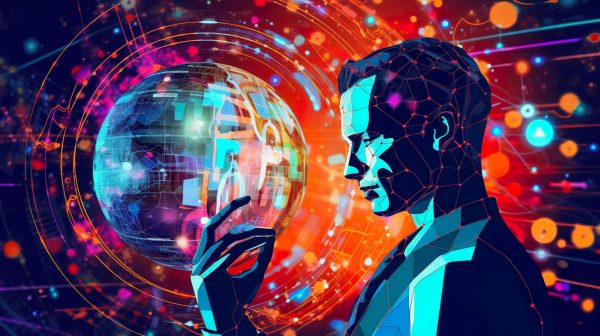With the continuous development of artificial intelligence technology, ChatGPT has become a member of the work scene that has attracted much attention. Its excellent language generation capabilities and intelligent algorithms have sparked discussions on the transformation and impact of the workplace. This article will explore what ChatGPT will look like in 2024 and discuss the possibility that it could take away jobs.
The Rise of ChatGPT and the Transformation of Jobs
ChatGPT, as a leading language model, has risen rapidly in recent years. In 2024, ChatGPT will usher in a subversive intelligence revolution, drawing attention to the transformation of jobs. As ChatGPT technology continues to improve and its applications expand widely, many people are starting to worry about whether it will take away their jobs.
The rapid development of ChatGPT has attracted attention
ChatGPT’s excellent performance in natural language processing and dialogue technology makes it a powerful assistant in work scenarios. It can interact with users in real time and provide instant suggestions, strategies and solutions. ChatGPT’s smart assistant function can help business owners, project managers, and individual workers manage their work efficiently and improve work efficiency to a new level. This rapid development has raised concerns about the future of work.
Threats and challenges to jobs
With the continuous intelligence of ChatGPT, people began to pay attention to the threats and challenges faced by jobs. Traditional human labor positions may be impacted by automation and intelligence, and some repetitive and low-skilled jobs may be replaced. For example, some jobs that rely on artificial intelligence technology, such as customer service representatives and data analysts, may be at risk. This has brought uncertainty and pressure to some industries and practitioners.
Impact and potential consequences of ChatGPT
The popularization and application of ChatGPT will have a wide range of impacts and potential consequences on the workplace. Although some jobs may be affected, it will also bring a series of opportunities and changes.
The wave of intelligence in the professional field is sweeping
With the popularization of intelligent technologies such as ChatGPT, many professional fields are experiencing a wave of intelligence. Traditional working methods and processes will be redefined and optimized. For example, in the medical industry, ChatGPT can help doctors diagnose diseases and formulate treatment plans, improving medical efficiency and accuracy. In the financial field, ChatGPT can assist investment analysis and risk management, and provide more accurate investment advice. These intelligent applications will bring higher efficiency and innovation to the industry.
Redefining the working relationship between artificial intelligence and humans
The rise of ChatGPT will also redefine the working relationship between artificial intelligence and humans. People will gradually be freed from repetitive and mechanical tasks to focus on creative, complex and human-interactive tasks. ChatGPT can be an assistant and collaborator of human work, helping people complete their work more efficiently and providing professional support and advice. This new model of human-machine collaboration will create more development opportunities for human beings and promote work innovation and progress.
Impact and potential consequences of ChatGPT
Transformation and Adaptation: Reorienting Vocational Skills and Development Direction
Facing the challenges brought by ChatGPT, individuals and businesses need to transform and adapt. It is particularly important to pay attention to the renewal and development of vocational skills. Individuals need to continue to learn and improve their professional abilities, and develop creative thinking and ability to solve complex problems. At the same time, companies need to invest in training and development programs to help employees adapt to the smart work environment and develop new skills and capabilities. Through transformation and adaptation, individuals and enterprises can seize the opportunities brought by ChatGPT and realize the improvement of work efficiency and competitiveness.
Cooperation and Innovation: Human-Machine Collaboration to Meet Future Challenges
Cooperating with ChatGPT and realizing human-machine collaboration will become an important trend in the future. Through cooperation and innovation, humans and ChatGPT can work together to meet future challenges. People can use ChatGPT as a smart assistant and creative inspiration at work to complete complex tasks and solve difficult problems together. The combination of human creativity and emotional intelligence and ChatGPT’s computing power and knowledge reserves will create new working models and possibilities.
In cooperation, people can use ChatGPT’s powerful search and sorting functions to obtain more information and resources, and improve work efficiency and accuracy. At the same time, people can jointly promote the development of innovation through brainstorming and creative exchanges with ChatGPT. ChatGPT can provide people with new creative ideas and design solutions, help them break through the limitations of traditional thinking, and create more competitive work results.
To sum up, the rise and application of ChatGPT will have a huge impact and potential consequences on the workplace. While some jobs may be threatened, it will also bring new opportunities and challenges. Individuals and enterprises should reposition their professional skills and development direction through transformation and adaptation. At the same time, through cooperation and innovation, humans and ChatGPT can realize human-machine collaboration and jointly cope with future challenges. Only by facing this intelligent revolution with a positive attitude can we better adapt to changes and achieve improvements in work efficiency and innovation.
